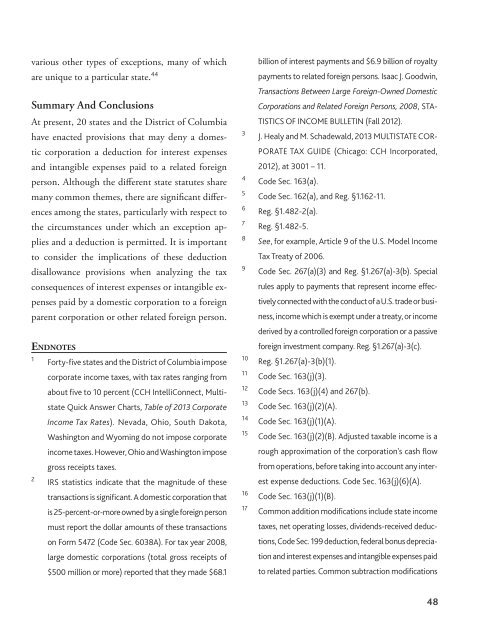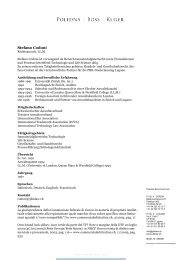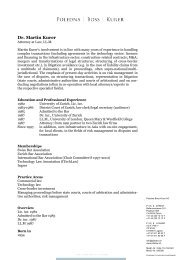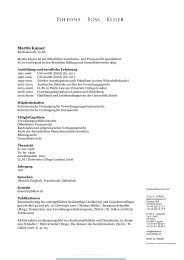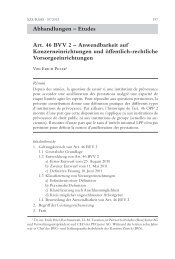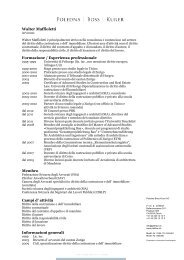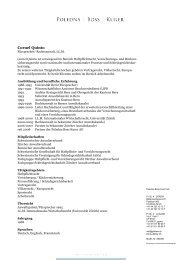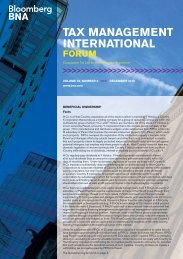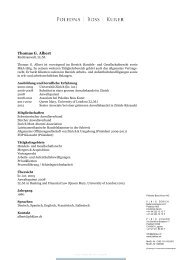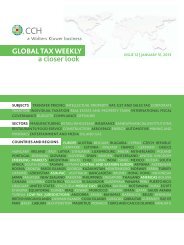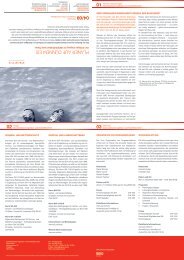various other types of exceptions, many of whichare unique to a particular state. 44Summary And ConclusionsAt present, 20 states and the District of Columbiahave enacted provisions that may deny a domesticcorporation a deduction for interest expensesand intangible expenses paid to a related foreignperson. Although the different state statutes sharemany common themes, there are significant differencesamong the states, particularly with respect tothe circumstances under which an exception appliesand a deduction is permitted. It is importantto consider the implications of these deductiondisallowance provisions when analyzing the taxconsequences of interest expenses or intangible expensespaid by a domestic corporation to a foreignparent corporation or other related foreign person.E NDNOTES12Forty-five states and the District of Columbia imposecorporate income taxes, with tax rates ranging fromabout five to 10 percent (CCH IntelliConnect, MultistateQuick Answer Charts, Table of 2013 CorporateIncome Tax Rates ). Nevada, Ohio, South Dakota,Washington and Wyoming do not impose corporateincome taxes. However, Ohio and Washington imposegross receipts taxes.IRS statistics indicate that the magnitude of thesetransactions is significant. A domestic corporation thatis 25-percent-or-more owned by a single foreign personmust report the dollar amounts of these transactionson Form 5472 ( Code Sec. 6038A ). For tax year 2008,large domestic corporations (total gross receipts of$500 million or more) reported that they made $68.134567891011121314151617billion of interest payments and $6.9 billion of royaltypayments to related foreign persons. Isaac J. Goodwin,Transactions Between Large Foreign-Owned DomesticCorporations and Related Foreign Persons, 2008 , STA-TISTICS OF INCOME BULLETIN (Fall 2012).J. Healy and M. Schadewald, 2013 MULTISTATE COR-PORATE TAX GUIDE (Chicago: CCH Incorporated,2012), at 3001 – 11.Code Sec. 163(a) .Code Sec. 162(a) , and Reg. §1.162-11.Reg. §1.482-2(a).Reg. §1.482-5.See , for example, Article 9 of the U.S. Model IncomeTax Treaty of 2006.Code Sec. 267(a)(3) and Reg. §1.267(a)-3(b). Specialrules apply to payments that represent income effectivelyconnected with the conduct of a U.S. trade or business,income which is exempt under a treaty, or incomederived by a controlled foreign corporation or a passiveforeign investment company. Reg. §1.267(a)-3(c).Reg. §1.267(a)-3(b)(1).Code Sec. 163(j)(3) .Code Secs. 163(j)(4) and 267(b).Code Sec. 163(j)(2)(A) .Code Sec. 163(j)(1)(A) .Code Sec. 163(j)(2)(B) . Adjusted taxable income is arough approximation of the corporation's cash flowfrom operations, before taking into account any interestexpense deductions. Code Sec. 163(j)(6)(A) .Code Sec. 163(j)(1)(B) .Common addition modifications include state incometaxes, net operating losses, dividends-received deductions,Code Sec. 199 deduction, federal bonus depreciationand interest expenses and intangible expenses paidto related parties. Common subtraction modifications48
include federal interest income, state net operatingisted when Illinois taxpayers could deduct royalties andloss deductions, state dividends-received deductions,interest paid to an 80/20 company ( see Zebra Technolo-Subpart F income, and Code Sec. 78 gross-up income.gies Corp. v. Dept. of Revenue , 344 Ill.App.3d 474 [2003]).18Md. Code. Ann., Tax-Gen. § 10-306.1.36Ga. Code Ann. § 48-7-28.3.19Ind. Code § 6 -3-1-3.5.3735 Ill. Comp. Stat. § 5/203.20Ind. Code § 6 -3-2-20.38Ind. Code § 6 -3-2-20.21N.Y. Tax Law § 208.9.39Mass. Gen. Laws ch. 63, § 31J .22Va. Code Ann. § 58.1-302 .40N.Y. Tax Law § 208.9 .23N.C. Gen. Stat. § 105-130.7A. The addback require-41Va. Code Ann. § 58.1-402 .ment also applies to any "time price differential42N.Y. Tax Law § 208.9 .charged for the late payment" of a royalty.43For example, in Beneficial New Jersey, Inc. v. Director,24Ky. Rev. Stat. Ann. § 141.205 . Management feesDivision of Taxation [No. 009886-2007 (N.J. Tax Ct.,includes expenses paid for "services pertaining toAug. 31, 2010)], the New Jersey Tax Court ruled thataccounts receivable and payable, employee ben-a finance company could deduct interest it paid on aefit plans, insurance, legal, payroll, data processing,loan from its parent corporation because the addbackpurchasing, tax, financial and securities, accounting,adjustment was unreasonable. See Technical Advisoryreporting and compliance services or similar services."Memorandum TAM-13 (N.J. Div. of Taxn., Feb. 24, 2011)25Wis. Stat. § 71.26 . See Wis. Stat. § 71.11 for a defini-for guidance regarding the types of situations in whichtion of "management fees" and "rental expenses."the New Jersey Division of Taxation will recognize the26Generally, a foreign corporation must be engaged indisallowance of a deduction to be unreasonable. Ona U.S. trade or business to qualify as a componentthe other hand, in Kimberly-Clark Corporation v. Com-member of a controlled group of corporations undermissioner of Revenue [981 N.E.2d 208 (2013)], the Mas-Code Sec. 1563 . Reg. §1.1563-1(b)(2) .sachusetts Appeals Court ruled that the unreasonable27Or. Rev. Stat. § 314.296 .adjustment exception was not satisfied. Likewise, in28N.Y. Tax Law § 208.9 .Surtees v. VFJ Ventures, Inc . [8 So.3d 983 (2008); cert.29Ark. Code Ann. § 26-51-423.denied , U.S. No. 08-916, Apr. 27, 2009], the Alabama30Wis. Stat. § 71.22 . Special rules apply to a real estateSupreme Court affirmed a lower court's decision thatinvestment trust.the addback adjustment was reasonable because the31See Reg. §1.267(a)-3(b)(1) for the definition of a "re-resulting tax was not "out of proportion" to the corpo-lated foreign person."ration's activities in Alabama.32Tenn. Code Ann. § 67-4-2004.44In addition to the exceptions summarized in Table 3,33Ala. Admin Code r. 810-3-35-.02, and Code Sec. 1504 .a few states ( e.g. , West Virginia) permit the related34Mich. Comp. Laws § 206.623 .payer to claim a credit for the taxes paid by the re-3535 Ill. Comp. Stat. §§ 5/203 and 5/1501. Illinois enactedlated payee on the corresponding income ( e.g. , W.this provision to close the perceived loophole which ex-Va. Code § 11-24-4b).49
- Page 1 and 2: GLOBAL TAX WEEKLYa closer lookISSUE
- Page 3 and 4: GLOBAL TAX WEEKLYa closer lookISSUE
- Page 5 and 6: FEATURED ARTICLESISSUE 30 | JUNE 6,
- Page 7 and 8: taxation treaties concluded by Swit
- Page 9 and 10: FEATURED ARTICLESISSUE 30 | JUNE 6,
- Page 11 and 12: FEATURED ARTICLESISSUE 30 | JUNE 6,
- Page 13 and 14: UK, its offshore dependencies, and
- Page 15 and 16: financing and all forms of financia
- Page 17 and 18: Th e Government pointed out in part
- Page 19 and 20: Talks are now underway. The TIEA wi
- Page 21 and 22: through which they can clamber in o
- Page 23 and 24: fi nally, and most egregiously, the
- Page 25 and 26: office space, or own tangible asset
- Page 27 and 28: extended for 2 years in December 20
- Page 29 and 30: Financial transactions ( e.g. inter
- Page 31 and 32: OECD Section E - Redraft On Safe Ha
- Page 33 and 34: suggests that the following items m
- Page 35 and 36: FEATURED ARTICLESISSUE 30 | JUNE 6,
- Page 37 and 38: State Interest And IntangibleExpens
- Page 39 and 40: States generally define "intangible
- Page 41 and 42: Code Sec. 1563(controlledgroup)Stat
- Page 43 and 44: ConnecticutGeorgiaIllinoisIndianaRe
- Page 45 and 46: Rhode IslandTennesseeVirginiaWest V
- Page 47: Table 4. Comprehensive Income Tax T
- Page 51 and 52: Recurring IssuesRestructuring of th
- Page 53 and 54: M&A. Nick has extensive experience
- Page 55 and 56: and consumers." As Germany and Chin
- Page 57 and 58: on many levels. The panel found tha
- Page 59 and 60: equirements placed on the states, i
- Page 61 and 62: NEWS ROUND-UP: COUNTRY FOCUS - ITAL
- Page 63 and 64: NEWS ROUND-UP: REAL ESTATE AND PROP
- Page 65 and 66: ates - such that, in 2014, the 4 pe
- Page 67 and 68: NEWS ROUND-UP: FTTISSUE 30 | JUNE 6
- Page 69 and 70: NEWS ROUND-UP: ENVIRONMENTAL TAXESI
- Page 71 and 72: Finally, the Federal Council veheme
- Page 73 and 74: Singapore Plugs Benefits For SMEsOf
- Page 75 and 76: TAX TREATY ROUND-UPISSUE 30 | JUNE
- Page 77 and 78: CONFERENCE CALENDARISSUE 30 | JUNE
- Page 79 and 80: Key speakers: John Capasso (Alvarez
- Page 81 and 82: Key speakers: TBA6/27/2013 - 6/27/2
- Page 83 and 84: 6/14/2013 - 6/14/2013http://www.con
- Page 85 and 86: THE CYPRUS BAIL-OUT ANDFOREIGN CLIE
- Page 87 and 88: Chair: Jonathan Levy (Partner, Reyn
- Page 89 and 90: IN THE COURTSISSUE 30 | JUNE 6, 201
- Page 91 and 92: on including the profit from the do
- Page 93 and 94: deduct VAT as a result of incomplet
- Page 95 and 96: where the taxpayer had somehow offs
- Page 97 and 98: een paid in the destination State.
- Page 99 and 100:
that Spain has gone its own way fir


